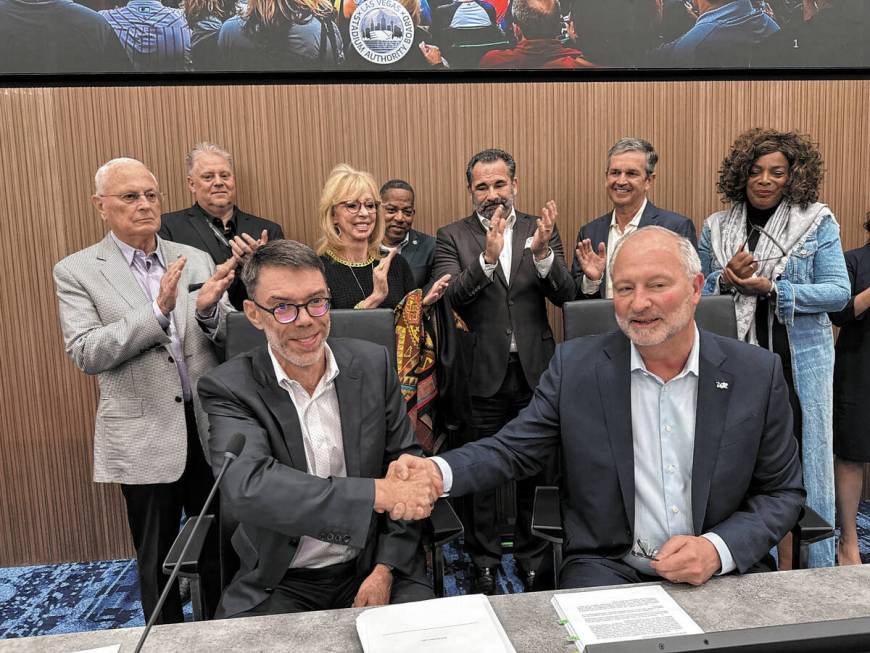‘A significant day for Las Vegas’: A’s ballpark plan clears major hurdle

The Athletics’ relocation to Las Vegas began touching bases Thursday with the approval of three long-anticipated agreements required for ballpark construction to begin.
The Las Vegas Stadium Authority approved the development, nonrelocation and lease agreements for the A’s planned $1.75 billion ballpark during a Thursday afternoon meeting. The agreements detail how the planned Strip stadium will be built and how the team’s tenure in Las Vegas will be regulated.
“It’s a really significant day for Las Vegas, for Nevada,” Las Vegas Stadium Authority Chairman Steve Hill said after the approvals. “There will be more of that. We’ll have the groundbreaking, we’re going to have a (stadium) topping off party and were going to have Opening Day. We’re going to have many years of Major League Baseball.”
The lease and nonrelocation agreements are for an initial term of 30 years, with the ability to extend the lease multiple times, up to 99 years. There are stipulations to what occurs if the A’s try to relocate before the lease is up or if the stadium becomes unplayable for a variety of reasons and what the team could do during that time.
The development agreement requires that the A’s spend the first $100 million on the project before public funding is made available for use. The A’s reported that they have already spent $40 million planning the project at the site of the imploded Tropicana.
The A’s will be responsible for project cost overruns; public funding available for the project is capped at $380 million, per Senate Bill 1.
Years of work
The approvals come 17 months after the signing of SB1 and after years of work researching and planning for the A’s 2028 relocation to Las Vegas.
“It’s a really exciting day for the A’s,” team executive Sandy Dean said after the meeting. “I’m really energized by having had this day be successful.”
Stadium construction financing was also discussed and approved Thursday, with the A’s presenting a series of letters breaking down the funding mechanisms and providing assurances from financial institutions about the Fisher family’s ability to pay for the project.
U.S. Bank Senior Vice President Stephen Vogel, who leads the institution’s sports banking practice, said the bank reviewed the Fisher family’s financial holdings and determined that the family has more than enough money to cover their stadium responsibilities.
“We concluded that the Fisher family and the related entities have financial assets more than sufficient to fund the equity portion of the proposed capital structure of the stadium,” Vogel said Thursday. “We look forward to working with members of the stadium authority, Major League Baseball and the Athletics leadership team, to complete the various steps necessary to see the company begin the construction process on the stadium in the coming months.”
Stadium construction costs are estimated at $1.75 billion, up $250 million from the initial $1.5 billion projection.
A’s owner John Fisher and his family will be responsible for $1.4 billion of the cost. That will be covered by a $1.1 billion Fisher family equity contribution and $300 million via a construction loan from U.S. Bank and Goldman Sachs.
The remaining $350 million will come from public funding made available through SB1.
What’s next?
Workforce requirements in SB1 stipulate that the A’s must ensure that 51 percent of workers in the stadium construction project be women, minority, veterans or disabled and that 15 percent of the stadium’s work be contracted to local businesses. The stadium authority will create a community benefits oversight committee to ensure those requirements and other community obligations are met.
The A’s will next work with Clark County officials on the entitlement process for the stadium land, a separate ballpark development agreement and the creation of a Sports and Entertainment Improvement District — which will raise the county’s portion of the public funding — before construction can begin.
The A’s plan to break ground on the project in the second quarter of 2025 and have the ballpark ready for Opening Day 2028. Until then, the A’s will play home games at a minor-league ballpark in Sacramento.
“We’re at the early stages with Clark County, but we’ve had several meetings and those have been really constructive,” Dean said. “Clark County has been really receptive to wanting to work with us and meet the timelines that are necessary for us to open in April of ’28. We’re at the front end of that, and we’ve got some work to do.”
Contact Mick Akers at makers@reviewjournal.com or 702-387-2920. Follow @mickakers on X.